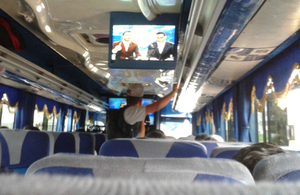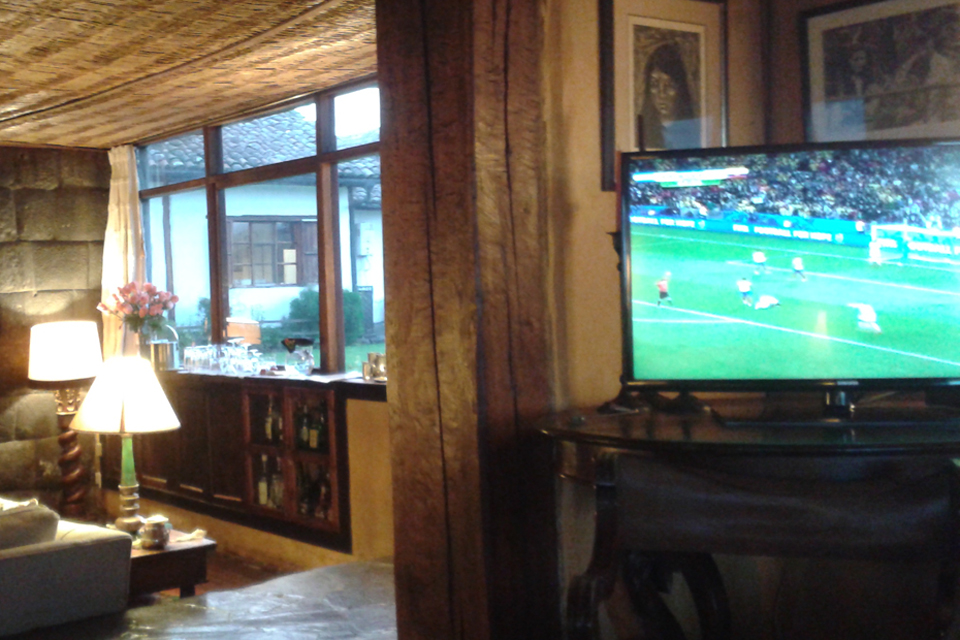A Football Series: Blog 2 - My Delirium on Cotopaxi
Professor Mathew Brown is visiting Ecuador to discover the history of football and its South American roots. This is the second blog about his visit to Cotopaxi in the middle of a "football-mad" country.

Bus ride to Cotopaxi
My mind is swallowed by a febrile delirium: I feel as though I am ignited by a strange and superior flame Simon Bolivar, My Delirium on Chimborazo, 1822.
Since the last moment of its first match, in which the team lost its composure so spectacularly, so embarrassingly, when they passed from the verge of victory to the abyss of defeat, Ecuador has lived the World Cup with a peculiar mixture of obsession and melancholy. I’ve been conducting research in the National Library and in the archive of the ‘El Comercio’ newspaper, and the World Cup is everywhere in public conversation and on screens.
Ecuador is there in Brazil, represented, and that is important. England is out, Spain is out, and Ecuador is still in. But for how long? The match against the Swiss was a must-win in order to get out of the group stages. A lost must-win. The match against Honduras, last Friday, therefore became a ‘must-win’ in order to still have a chance of surviving, and in order to not lose face to the other South American teams who were enjoying a wave of success. The previous day, my children came home from school carrying notes from their teachers explaining that they could wear their national football shirts for the day of the big match. They didn’t mean England shirts (it’s best if I don’t talk at all here about England’s brief participation in the World Cup) and some friends lent us Ecuadorian shirts. The school was dressed in yellow and blue.
The match was due to start at 5pm. During the day, in the library, cafes and streets, I asked people what hopes they had for the big match. “We have to have faither, and a little luck” was the refrain. People were critical of the coach, as usual, but the fan in the street didn’t want to talk tactics or personnel. Faith was central. The footballers had to have faith in themselves. If they had faith in themselves, the fans could also have faith in them.
At 3pm we catch a taxi to the bus terminal, from where we will travel to spend the weekend in the midst of Ecuador’s central volcanoes. The first taxi to stop wants to charge triple the usual price, “because of the football”. The second wont take us, “because of the football, I have to get home to watch it, otherwise I’d love to”. The third taxi-driver is friendly and happy to drive us. Like me, he prefers to listen to radio commentary of football rather than watch it on tv. We agree that we are the last audio-romantics, leftovers from the 1940s. He tells me that the team represents the nation, and that their last minute failure was a result of assuming that talent would do the job, and not paying enough attention to context and the rules of the game. It was the lack of seriousness, the lack of preparation, that cost them against Switzerland. “Will they beat Honduras?” I ask. “If they have faith”, he smiles in reply.
The roads are packed with cars, buses and taxis, and it feels like the whole city is moving from one end to the other to watch the match. I do not have much faith that we will ever get out of the infernal traffic jams but we do, and at 4pm we get on a bus run by the Cotopaxi firm to travel to Lasso, near the volcano. I had faith, and I received what I deserved: the bus has a tv, and we can watch the build-up to the match.
There are lots of commercials and adverts, some of which are quaintly read out from reams of paper by the presenters. No one sings the national anthem. The match begins. We gradually leave the metropolis of Quito. The tv signal disappears. We shout. It reappears, in black and white. The commentary comes and goes. No one knows what is happening in Curitiba. The family sitting by my side are from Latacunga. Will the Tri win? I ask. “If they have faith” say the adults. “YEEEESS!!’ say the kids.

Watching the match in Cotopaxi
At 5.30pm we get off the bus without any idea of the score. We jump into a 4x4 which takes us to a Hacienda which Alexander von Humboldt visited 200 years ago. We get there at the end of the first half. 1-1. We make ourselves comfortable in the living room, which boasts a wall from the times of the Incas, and an enormous flat-screen tv. We watch the rest of the match with an Ecuadorian couple who don’t know how long a football match lasts. 90 minutes seems rather excessive to them, and I agree. Enner Valencia scores, and after much agony, 2-1 is enough. Ecuador wins. We hug each other.
We have a lovely weekend by Cotopaxi volcano. I ride a borrowed bike up to the entrance to the National Park, and I can appreciate the amazing nature of the landscape here. As Simon Bolivar said two centuries ago, here the air may have less oxygen, but it opens the imagination, and lets you believe that your dreams can become reality.
Now Ecuador just has to beat France. And have faith.